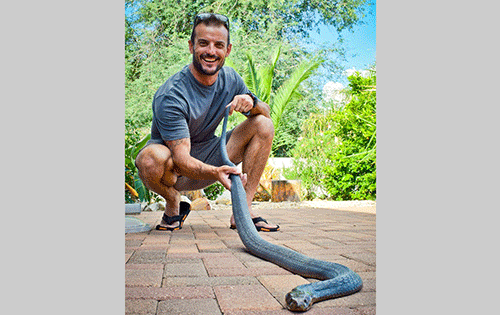As snake season stretches from August through May, experts are urging the public to resist the impulse to kill snakes, and instead see them as crucial allies in maintaining a healthy ecosystem.
For local conservationist and snake handler Jacobus Henn, the mission is clear: protect snakes and protect the environment.
Working alongside renowned herpetologist Francois Theart, he has co-managed the Snakes of Namibia group since 2018, and has been at the frontline of education and snake rescue in both urban and rural areas.
“People often panic when they see a snake,” Henn says. “But snakes are not out to harm us. They’re just following food sources like rats, mice, lizards and frogs, many of which are drawn to human waste and garden debris.”
Snakes are nature’s pest control, he said.
One adult mole snake can eat up to 10 000 rodents in its lifetime. That is not just impressive, but critical. Rats and mice are major carriers of disease and without natural predators like snakes, their populations can explode, threatening both human health and food security.
Yet, fear and misinformation still lead to unnecessary killings of snakes.
“There’s no effective snake repellent,” Henn adds. “No sprays, no special plants, no diesel or petrol will keep them away. The only real solution is a clean yard without garbage, no building rubble and no excessive vegetation.”
Namibia’s biodiversity is one of its greatest treasures, but also one of its most sensitive. With urban expansion pushing deeper into natural habitats, human-snake encounters are inevitable. When that happens, experts recommend calling trained professionals rather than taking matters into your own hands.
“Trying to kill a snake, especially a venomous one, puts you at greater risk,” he says. “These animals are fast, and bites can be deadly. But if you leave it alone and call a snake catcher, it can be safely removed and relocated.”
The warning comes as the continent faces a shortage of life-saving anti-venom. Namibia currently has around 300 vials in stock, which is a manageable but limited supply. Elsewhere in Africa, the situation is far more dire. Countries like Kenya are in urgent need of tens of thousands of doses, with access limited by both availability and high costs.
Public education is a key part of prevention. The Snakes of Namibia team regularly visits schools, rural villages and community centres to teach people how to identify, avoid and safely live alongside snakes. “We don’t want people to live in fear. We want them to understand that these animals are not the enemy,” Henn says. “Killing snakes not only disrupts the balance of the ecosystem, but can also be dangerous.” –isipunga@nepc.com.na



